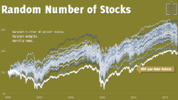Duc, you mention Currencies as both 'long trending' and 'mean reversion' in nature. Was that deliberate?...........................The timeframe is a critical component, as is the choice of market. So long trending markets: Bonds, Currencies and with the current QE, stocks (which have gone up since year dot, with a few bad breaks). Reversion to mean markets are Commodities and Currencies.
Anyway, far too long a post.
jog on
duc
Dump it Here
- Thread starter Skate
- Start date
- Joined
- 13 February 2006
- Posts
- 5,408
- Reactions
- 12,588
Duc, you mention Currencies as both 'long trending' and 'mean reversion' in nature. Was that deliberate?
Steve,
Yes it was. Currencies typically trend for long periods. They also, for macro based reasons to do with the internal politics/economics of their home nation, tend to revert to the mean.
Some examples:
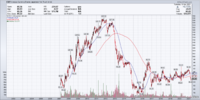
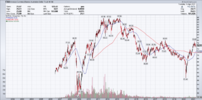
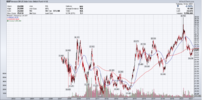
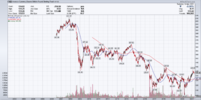
As opposed to SPY
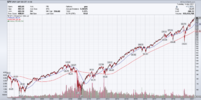
jog on
duc
- Joined
- 13 February 2006
- Posts
- 5,408
- Reactions
- 12,588
I'm sure it is just my pea brain not comprehending what you are saying, but if by "higher number of trades taken" you mean with reference to the total number of trades taken over a certain period of time (e.g., 5, 10, 20 plus) years then I completely agree with what you say.
But if this is simply about saying: if your system has an edge then moving from say a max of 10 simultaneous open positions to a max of 20 simultaneous open positions then I don't agree with that. But I think you are referring to the former and not the latter?
Mr MA,
Both, but possibly not quite how you have stated it. Let me clarify.
Since we agree on one, we only need discuss the one that we don't agree on.
Just to clarify my position re. proposition #2:
If a system with a true edge, throws up 100 trades in a week, all those trades ought to be taken. Now, due to the number of trades, our trader may not have the available capital to take all 100. He may only have the capital to take 50.
My assertion is: this could negatively impact the system (or conversely positively or not at all) because the 'edge' is only valid when you take all of the trades. In taking only 50, we are now subjecting the trades to the law of small numbers: ie. randomness/luck play a much larger role in the results.
A thought experiment:
If a system, with a true edge, throws up 100 trades then are:
(i) all trades winners? If yes, then only taking 50 will reduce the number of winning trades. If no, then;
(ii) which ones will lose? Do we know the answer, yes/no?
(iii) if we know the answer to (ii) as a yes, then we will only take the winning trades.
jog on
duc
MovingAverage
Just a retail hack
- Joined
- 23 January 2010
- Posts
- 1,315
- Reactions
- 2,565
I'm not sure what you're saying here. Are you saying your hypothetic system's edge is only there when you take up all buy signals it generates? As a general statement you absolutely do not need to take all positions a system throws up to have an edge. If your system throws up more buys than you have capital then a well thought out and tested ranking and selection of buy signals will absolutely remove a significant part of the randomness you reference. Sure if you don't employ a good technique for ranking and selecting buy sigs in situations where capital doesn't allow you to take all entries (and let's face it that is most people) then sure a degree of randomness will be present, but surely even simple retail system traders would employ the most rudimentary ranking mechanism for buy sigs which would address some of the randomness.If a system with a true edge, throws up 100 trades in a week, all those trades ought to be taken. Now, due to the number of trades, our trader may not have the available capital to take all 100. He may only have the capital to take 50.
- Joined
- 8 June 2008
- Posts
- 13,700
- Reactions
- 20,415
Can I add a bit of a twist from my view:Mr MA,
Both, but possibly not quite how you have stated it. Let me clarify.
Since we agree on one, we only need discuss the one that we don't agree on.
Just to clarify my position re. proposition #2:
If a system with a true edge, throws up 100 trades in a week, all those trades ought to be taken. Now, due to the number of trades, our trader may not have the available capital to take all 100. He may only have the capital to take 50.
My assertion is: this could negatively impact the system (or conversely positively or not at all) because the 'edge' is only valid when you take all of the trades. In taking only 50, we are now subjecting the trades to the law of small numbers: ie. randomness/luck play a much larger role in the results.
A thought experiment:
If a system, with a true edge, throws up 100 trades then are:
(i) all trades winners? If yes, then only taking 50 will reduce the number of winning trades. If no, then;
(ii) which ones will lose? Do we know the answer, yes/no?
(iii) if we know the answer to (ii) as a yes, then we will only take the winning trades.
jog on
duc
->100 trades proposed by the system:
these trades have a higher probabilities of winning than randomly chosen ones-> " our edge"
not all will win, but we know that we also select n of of these based on another statistically favorable criteria : a preference order: the score
So we have another variable in our equation:the preference criteria, so not binary buy sell, more "in buy pool" or sell
And even based on its score, the 10th choice today may ( will) have a different probability of a win vs tomorrow's 10th proposed entry
Basically we can see it that way: my system might offer a couple of trades per week ( I believe this is your vision)
or
a pool of higher than average candidates that we will pick from (trying as well to put better odds in that selection) aiming an average win/loss ratio >1;
[with all index twists, panic exits coded, etc]
I run both types of systems.
One pretty selective with low number of entries (my weekly ) with maybe 4/5 entries suggested per week;
and some like Guppy ->250 or so trades in less than 4 months.
36 entries offered this morning, 13 yesterday for 13 position max...
-> this school of mind in line with Mr Skate's view that in trend following,
the entry is not critical, just exit if wrong and roll the dice again;
I obviously caricature a bit.
Market as a casino where you can exit at will, with limited loss and unlimited win potential...within limits
-> a number game.
Hope this explanation is not too blurry.
So yes I expect to have better results for limited number of position, but not to the extreme I saw
:
MovingAverage
Just a retail hack
- Joined
- 23 January 2010
- Posts
- 1,315
- Reactions
- 2,565
I agree entirely with this.So yes I expect to have better results for limited number of position, but not to the extreme I saw
Obviously I don't know your system, but I live trade a swing system. It has a theoretical high % of winners (65-70%) but those winners each only generate very slim net profits. I offset the slim winners with large position sizes and fewer positions because after all like most traders I'm capital constrained. Because 65-70% of all buys sig's are winners (albeit very slim profit) I have a high level of confidence that my small number of actual positions (much much less then potential buy sig's) doesn't introduce an artificial "edge" into my system. The system generates lots of daily buys--way more than I have capital for so I use a ranking system that is probability based using historical behavior so I'm confident to say it's performance isn't just down to random selection of buys.
- Joined
- 28 December 2013
- Posts
- 6,392
- Reactions
- 24,319
Glaringly absent on this thread is anyone building a system, actually stating what their edge is, in simple and concise terms. (assuming there is a true edge)
a degree of randomness
A traders edge
@ducati916 & @MovingAverage may be onto something debating an edge. The question for me is - "when is an edge useful" when it comes to trading. The edge might be nothing more than the randomness of entries or the confidence to have a go. Randomness could be anything & everything from, the volatility of the markets, external influences, or world events - who knows!
System trading
This type of trading relies solely on exploiting a perceived edge rather than an edge. System trading is purely a vehicle to "timing the markets". But what if there is no "real edge" but fooled into thinking there is one. What if our trading results are purely down to "luck". Pure luck in "timing the entry/exit?" - it's food for thought.
Thinking about trading on a deeper level
I might be fooling myself, thinking I have an edge but in reality, I have no edge at all. My trading returns could be from being a lucky trader. I truly hope not as it means that I've wasted a chunk of my life.
Trading results of approximately 600 trades (over the last two years)
I could be mistaken but I believe the stats below are in line with trading a "trend following strategy" & nothing spectacular. The statistics are the "average returns" from trading a multitude of strategies (instead of just one). The performance of individual strategies varies but in combination they tend to even out my equity curve (my trading emotions).
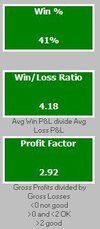
Skate.
MovingAverage
Just a retail hack
- Joined
- 23 January 2010
- Posts
- 1,315
- Reactions
- 2,565
I never understand what exactly "edge" is meant to reference....I see it thrown around a lot but the way I see it commonly used I assume it is with reference to the high level strategy underpinning your system--which might include entry/exit rules, risk management, position sizing, ranking etc etc.A traders edge
@ducati916 & @MovingAverage may be onto something debating an edge. The question for me is - "when is an edge useful" when it comes to trading. The edge might be nothing more than the randomness of entries or the confidence to have a go. Randomness could be anything & everything from, the volatility of the markets, external influences, or world events - who knows!
- Joined
- 8 June 2008
- Posts
- 13,700
- Reactions
- 20,415
Can I add a bit of a twist from my view:Mr MA,
Both, but possibly not quite how you have stated it. Let me clarify.
Since we agree on one, we only need discuss the one that we don't agree on.
Just to clarify my position re. proposition #2:
If a system with a true edge, throws up 100 trades in a week, all those trades ought to be taken. Now, due to the number of trades, our trader may not have the available capital to take all 100. He may only have the capital to take 50.
My assertion is: this could negatively impact the system (or conversely positively or not at all) because the 'edge' is only valid when you take all of the trades. In taking only 50, we are now subjecting the trades to the law of small numbers: ie. randomness/luck play a much larger role in the results.
A thought experiment:
If a system, with a true edge, throws up 100 trades then are:
(i) all trades winners? If yes, then only taking 50 will reduce the number of winning trades. If no, then;
(ii) which ones will lose? Do we know the answer, yes/no?
(iii) if we know the answer to (ii) as a yes, then we will only take the winning trades.
jog on
duc
->100 trades proposed by the system:
these trades have a higher probabilities of winning than randomly chosen ones-> " our edge"
not all will win, but we know that we also select n of of these based on another statistically favorable criteria : a preference order: the score
So we have another variable in our equation:the preference criteria, so not binary buy sell, more "in buy pool" or sell
And even based on its score, the 10th choice today may ( will) have a different probability of a win vs tomorrow's 10th proposed entry
Basically we can see it that way: my system might offer a couple of trades per week ( I believe this is your vision)
or
a pool of higher than average candidates that we will pick from (trying as well to put better odds in that selection) aiming an average win/loss ratio >1;
[with all index twists, panic exits coded, etc]
I run both types of systems.
One pretty selective with low number of entries (my weekly ) with maybe 4/5 entries suggested per week;
and some like Guppy ->250 or so trades in less than 4 months.
36 entries offered this morning, 13 yesterday for 13 position max...
-> this school of mind in line with Mr Skate's view that in trend following,
the entry is not critical, just exit if wrong and roll the dice again;
I obviously caricature a bit.
Market as a casino where you can exit at will, with limited loss and unlimited win potential...within limits
-> a number game.
Hope this explanation is not too blurry.
So yes I expect to have better results for limited number of position, but not to the extreme I saw
:
For me an edge.. positive edge is anything which will give you higher returns than the matching indexI never understand what exactly "edge" is meant to reference....I see it thrown around a lot but the way I see it commonly used I assume it is with reference to the high level strategy underpinning your system--which might include entry/exit rules, risk management, position sizing, ranking etc etc.
even just buying this index etf and exiting on a crash and reentering after.
So i think everyone has his own interpretation.
- Joined
- 13 February 2006
- Posts
- 5,408
- Reactions
- 12,588
1. I'm not sure what you're saying here. Are you saying your hypothetic system's edge is only there when you take up all buy signals it generates?
2. As a general statement you absolutely do not need to take all positions a system throws up to have an edge.
3. If your system throws up more buys than you have capital then a well thought out and tested ranking and selection of buy signals will absolutely remove a significant part of the randomness you reference.
4. Sure if you don't employ a good technique for ranking and selecting buy sigs in situations where capital doesn't allow you to take all entries (and let's face it that is most people) then sure a degree of randomness will be present, but surely even simple retail system traders would employ the most rudimentary ranking mechanism for buy sigs which would address some of the randomness.
1. Essentially, yes. That is the purpose of defining an edge.
2. Well no you don't, but then you are trading something other than your edge.
3. Which is the law of small numbers writ large. You are selecting a sample from a sample. The only way this is false is if your edge as identified has a 100% win rate.
4. There is no 'good' technique. You are dealing with a too small sample to ascribe any statistical significance to it. It will be random/luck.
Your position is essentially this:
(i) I have a system with an edge that delivers 20 trades/week to me; and
(ii) I can only assign capital to 5 of them each week; therefore
(iii) I will only take the winners and discard the rest.
Therefore, if 1 trade out of the 5 selected is actually a loser, then the above statement must be false, based upon Popper's falsifiability.
jog on
duc
- Joined
- 13 February 2006
- Posts
- 5,408
- Reactions
- 12,588
Can I add a bit of a twist from my view:
->100 trades proposed by the system:
these trades have a higher probabilities of winning than randomly chosen ones-> " our edge"
not all will win, but we know that we also select n of of these based on another statistically favorable criteria : a preference order: the score
So we have another variable in our equation:the preference criteria, so not binary buy sell, more "in buy pool" or sell
And even based on its score, the 10th choice today may ( will) have a different probability of a win vs tomorrow's 10th proposed entry
Basically we can see it that way: my system might offer a couple of trades per week ( I believe this is your vision)
or
a pool of higher than average candidates that we will pick from (trying as well to put better odds in that selection) aiming an average win/loss ratio >1;
[with all index twists, panic exits coded, etc]
I run both types of systems.
One pretty selective with low number of entries (my weekly ) with maybe 4/5 entries suggested per week;
and some like Guppy ->250 or so trades in less than 4 months.
36 entries offered this morning, 13 yesterday for 13 position max...
-> this school of mind in line with Mr Skate's view that in trend following,
the entry is not critical, just exit if wrong and roll the dice again;
I obviously caricature a bit.
Market as a casino where you can exit at will, with limited loss and unlimited win potential...within limits
-> a number game.
Hope this explanation is not too blurry.
So yes I expect to have better results for limited number of position, but not to the extreme I saw
:
For me an edge.. positive edge is anything which will give you higher returns than the matching index
even just buying this index etf and exiting on a crash and reentering after.
So i think everyone has his own interpretation.
The problem is that total randomness can also beat the index.
jog on
duc
MovingAverage
Just a retail hack
- Joined
- 23 January 2010
- Posts
- 1,315
- Reactions
- 2,565
Really, you have to take all positions to define an edge? Come on...I'm curious, do you actively trade systems?1. Essentially, yes. That is the purpose of defining an edge.
2. Well no you don't, but then you are trading something other than your edge.
3. Which is the law of small numbers writ large. You are selecting a sample from a sample. The only way this is false is if your edge as identified has a 100% win rate.
4. There is no 'good' technique. You are dealing with a too small sample to ascribe any statistical significance to it. It will be random/luck.
Your position is essentially this:
(i) I have a system with an edge that delivers 20 trades/week to me; and
(ii) I can only assign capital to 5 of them each week; therefore
(iii) I will only take the winners and discard the rest.
Therefore, if 1 trade out of the 5 selected is actually a loser, then the above statement must be false, based upon Popper's falsifiability.
jog on
duc
Anyway, I've been down this path with you before and I'm a grumpy old man who likes to argue
 ....so let's just agree to disagree
....so let's just agree to disagree  After all, the fact we all have differing approaches is what allows us to trade.
After all, the fact we all have differing approaches is what allows us to trade.- Joined
- 13 February 2006
- Posts
- 5,408
- Reactions
- 12,588
1. I never understand what exactly "edge" is meant to reference....I see it thrown around a lot but the way I see it commonly used I assume it is with reference to the high level strategy underpinning your system--
2. which might include entry/exit rules, risk management, position sizing, ranking etc etc.
Now we are getting somewhere. Yes, an edge can be include your list in [2]. However, that is not what I define an edge as. I define an edge as a strategy that has a positive expectation in any market conditions, including outliers (Black Swans). In fact, a true edge actually benefits from an outlier.
I trade 3 strategies. 2/3 have the edge described above. The other, does also, but not to the added qualification of outliers. For that I need luck.
Some of these systems I doubt actually have an edge at all in terms of [1]. They seemingly derive their edge from [2].
jog on
duc
- Joined
- 13 February 2006
- Posts
- 5,408
- Reactions
- 12,588
1. Really, you have to take all positions to define an edge? Come on...I'm curious, do you actively trade systems?
2. Anyway, I've been down this path with you before and I'm a grumpy old man who likes to argue....so let's just agree to disagree
After all, the fact we all have differing approaches is what allows us to trade.
1. Do I trade a mechanical system(s): yes, although none of them resemble systems in this thread.
2. Ok, that's fine.
jog on
duc
MovingAverage
Just a retail hack
- Joined
- 23 January 2010
- Posts
- 1,315
- Reactions
- 2,565
Now we are getting somewhere. Yes, an edge can be include your list in [2]. However, that is not what I define an edge as. I define an edge as a strategy that has a positive expectation in any market conditions, including outliers (Black Swans). In fact, a true edge actually benefits from an outlier.
I trade 3 strategies. 2/3 have the edge described above. The other, does also, but not to the added qualification of outliers. For that I need luck.
Some of these systems I doubt actually have an edge at all in terms of [1]. They seemingly derive their edge from [2].
jog on
duc
Not biting

- Joined
- 8 June 2008
- Posts
- 13,700
- Reactions
- 20,415
Sometimes, but not consistently so the MC runs on top of long enough test perios to ensure enough trades.The problem is that total randomness can also beat the index.
jog on
duc
Obviously to be qualified as index can be twisted
with banks woolies coles and bhp rio enough to make a significant part of the index : they would be hard to hit randomly so we can have random beating the index should for example small caps beat asx20 etc
MovingAverage
Just a retail hack
- Joined
- 23 January 2010
- Posts
- 1,315
- Reactions
- 2,565
Yup, anyone that does proper analysis and understands systems would not seriously suggest that a random system CONSISTANTLY beats the index. That is just a naïve statement.Sometimes, but not consistently so the MC runs on top of long enough test perios to ensure enough trades.
MovingAverage
Just a retail hack
- Joined
- 23 January 2010
- Posts
- 1,315
- Reactions
- 2,565
View attachment 122479
There's a great article by Andreas Clenow HERE on the subject of why randomness will beat the index / funds.
Sorry, but these are hardly random. This article talks about a very clear organized system as a whole: it has a well defined stock universe (e.g., S&P 500), when to buy and when to sell (e.g., start of each month), a position sizing (e.g volatility based or random allocation), and how to pick stocks. As a system per se this is not random and has clear rules for entry and exit. Yes, it has some random elements (e.g., randomly pick fifty stock from the S&P 500), but to suggest this is just monkeys throwing darts at a stock list is wrong. A truly random system would just randomly buy and sell whenever and NOT pick buys and sells at the start of the month from only the S&P 500. Like I say, yes this system employs random elements but to suggest it is just a random system is wrong. This article is nothing more than a review of a very poor system IMHO.
- Joined
- 13 February 2006
- Posts
- 5,408
- Reactions
- 12,588
1. A traders edge
@ducati916 & @MovingAverage may be onto something debating an edge. The question for me is - "when is an edge useful" when it comes to trading. The edge might be nothing more than the randomness of entries or the confidence to have a go. Randomness could be anything & everything from, the volatility of the markets, external influences, or world events - who knows!
2. System trading
This type of trading relies solely on exploiting a perceived edge rather than an edge. System trading is purely a vehicle to "timing the markets". But what if there is no "real edge" but fooled into thinking there is one. What if our trading results are purely down to "luck". Pure luck in "timing the entry/exit?" - it's food for thought.
3. Thinking about trading on a deeper level
I might be fooling myself, thinking I have an edge but in reality, I have no edge at all. My trading returns could be from being a lucky trader. I truly hope not as it means that I've wasted a chunk of my life.
Trading results of approximately 600 trades (over the last two years)
I could be mistaken but I believe the stats below are in line with trading a "trend following strategy" & nothing spectacular. The statistics are the "average returns" from trading a multitude of strategies (instead of just one). The performance of individual strategies varies but in combination they tend to even out my equity curve (my trading emotions).
View attachment 122474
Skate.
1. I think that there is broad agreement that trading discipline can be considered an 'edge'. Trading discipline can be enforced through (blind) adherence to a systematic entry/exit signal. Your systems that you have made public certainly fall into this category, at least superficially.
2. Which moves us onto the second type of edge, which is a market truism or anomaly, that can be exploited through buying or selling financial instruments. This edge can be articulated in a sentence. If you cannot articulate your edge in a sentence, you probably have no edge. Now, as already stated, it can be a Type I edge (see above) or a Type II edge. A Type II edge is a stronger edge and will have a much higher win%. The issue can be ROI. (see below).
3. Your systems superficially (what we on the forum can see) is a Type I edge. That is not to say there isn't a Type II edge in there, simply not disclosed to the forum.
4. Based on the results: I would conclude a Type I edge.
From the above, some might conclude that I am 'negative' on a Type I edge. Untrue. Type I edges have a very important characteristic that a number of Type II edges do not possess: the ability to really let profits run. Type II edges (tend) to have definite profit targets or time-in-trade limits. You close the trade when the profit target is achieved and/or time expires.
An example of a Type II edge (this is an example: it is NOT A REAL EDGE) could be 'Seasonality': buy/sell at the start of the month, close at the end, based on seasonality data. The edge lasts 1 month. Profits cannot run past that 1 month period. However, if your success rate is 100%, you may be satisfied to trade that edge, in spite of the fact that your profits are capped.
I don't know this, but looking at a number of systems that appear on the forum, they all look like Type I systems. Now if that is true, then I can refute my previous argument re. the requirement to take 100% of all trades thrown up by the system.
A Type I edge is largely a discipline based edge. There is no Type II edge present, therefore, taking a sample from a sample is irrelevant, as the edge, discipline, is present in every trade taken. There is no Type II edge to be blunted through the trading of a smaller sample.
However, selecting trades based in some form of statistical hierarchy, is simply fooling yourself. If you are trading a Type I edge, all trades are equi-probable.
jog on
duc
Similar threads
- Poll
- Replies
- 258
- Views
- 22K

